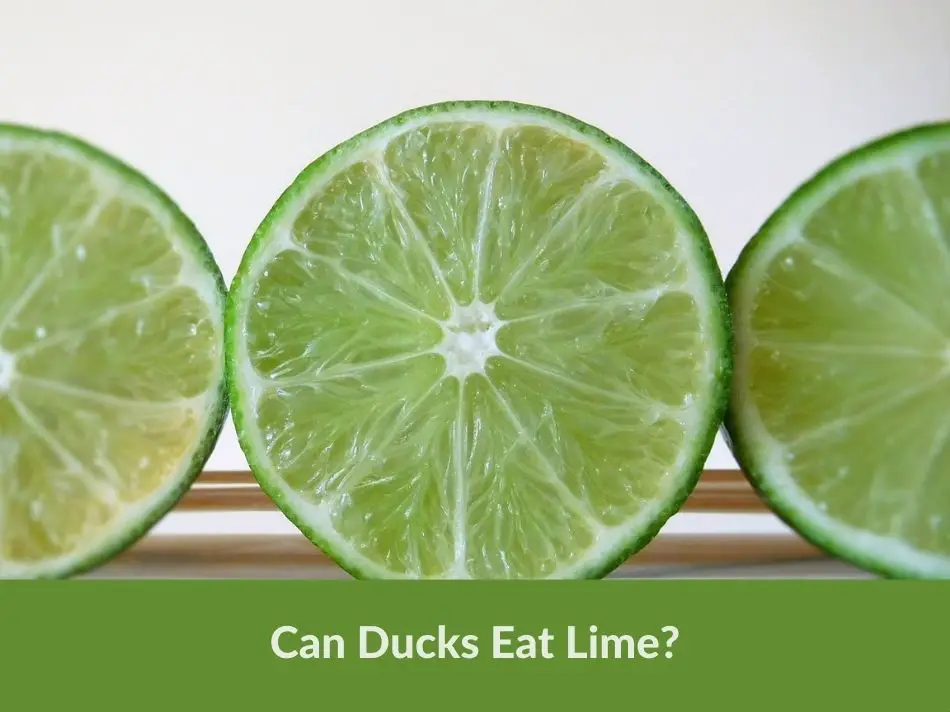Ducks are omnivorous creatures, meaning they eat both plant-based and animal-based foods. In their natural habitat, ducks typically forage for a variety of grains, seeds, aquatic plants, insects, and small fish. But, can ducks eat lime?
No, ducks should not eat lime because they contain citrus acid and limonin, which can be toxic to ducks. It can also interfere with their calcium absorption, potentially making their egg shells thinner.
In this article, we will explore why lime, though nutritious for humans, is not suitable for ducks. From its high citric acid content to potential toxic compounds and nutritional imbalances, you’ll discover the reasons why lime should be avoided in a duck’s diet.
Why Should Ducks Not Eat Lime?
It may be tempting to feed ducks various types of food, thinking that if it’s good for humans, it must be okay for ducks. However, feeding ducks inappropriate food can lead to a host of health issues for them. One such item to steer clear of is lime, the green citrus fruit. While lime is rich in nutrients like Vitamin C for humans, it’s not appropriate for ducks.
Here’s why:
1. Citrus Acid Content
Lime, like all citrus fruits, contains high levels of citric acid. Ducks have a different digestive system than humans and aren’t equipped to handle such high levels of acidity. Citric acid can lead to gastrointestinal issues in ducks, including diarrhea or digestive upset.
2. Essential Oil and Limonin
Citrus fruits contain oils and compounds that can be toxic to birds. One of these compounds is limonin, which can affect the liver and kidneys of ducks adversely. These organs are crucial for detoxification and aid in digestion. Impaired liver or kidney function can lead to a host of other health issues for ducks.
3. Calcium Absorption
Citrus fruits can interfere with calcium absorption, an essential mineral for ducks, especially for laying females. Lack of calcium can result in thin eggshells and even egg-binding, a life-threatening condition where the bird can’t pass the egg.
4. Natural Diet
Ducks have evolved to consume a specific type of diet that is rich in grains, plants, and small proteins like insects and fish. This diet is balanced and provides them with the nutrients they need for growth, feather development, and overall health. Adding foreign foods like lime can disrupt this balance and lead to nutrient deficiencies or excesses.
5. Risk of Pesticides
Unless the lime is organic, it may have been treated with pesticides that are harmful to ducks. Even washing the fruit might not remove all pesticide residues, posing an additional health risk.
Other Fruits Ducks Can Eat
While limes are off the menu for ducks, many other fruits are not only safe but also nutritious and enjoyable for these feathered friends. Fruits like apples, grapes, and watermelon can be great treats in moderation. These can provide hydration and additional nutrients, enriching the diet of ducks both in the wild and in domestic settings.
Make sure to check out our full list of fruit ducks can eat.
Conclusion
While limes are a nutritious fruit for humans, they are not suitable for ducks due to their high citric acid content, potential toxicity, and other nutritional drawbacks. To maintain the health and well-being of ducks, it’s essential to provide them with foods that are appropriate for their unique digestive systems and nutritional needs.
Disclaimer: The information in this article is for informational purposes only. I'm not an expert or a veterinarian.


